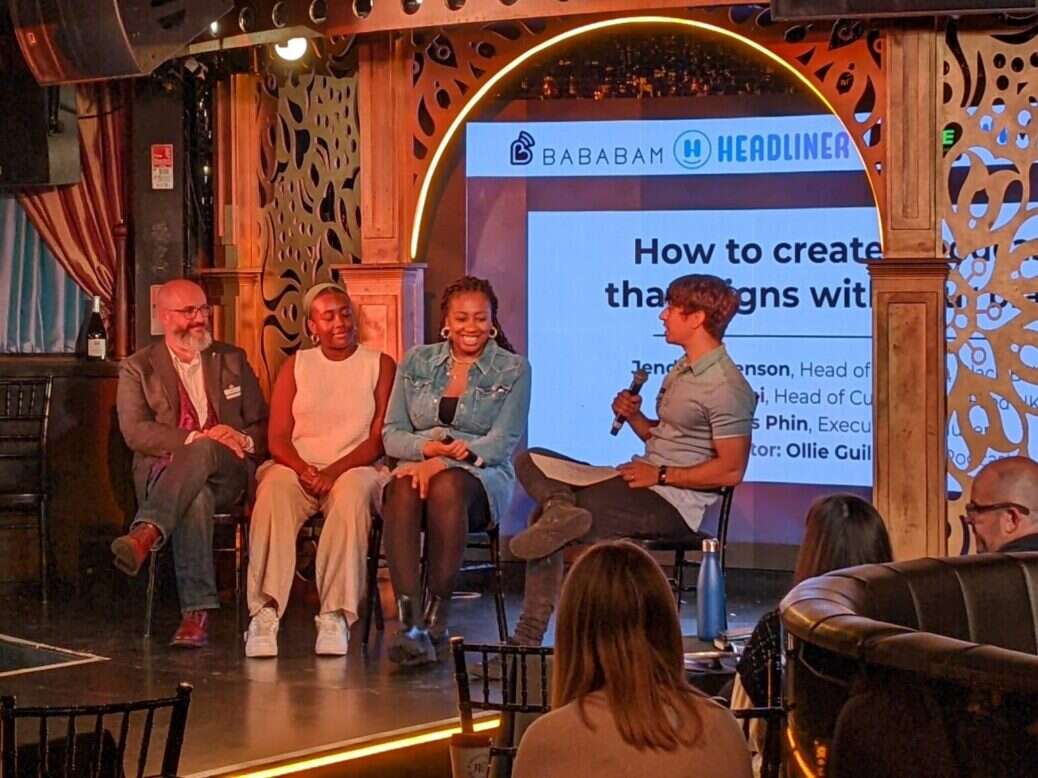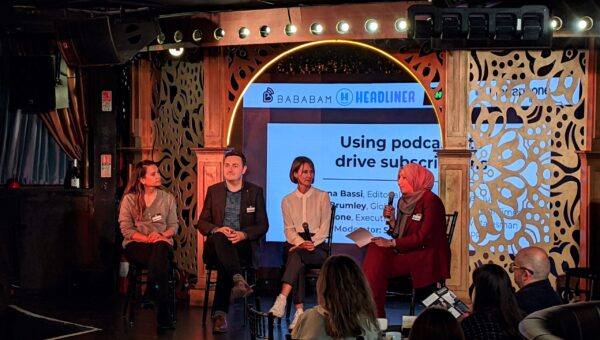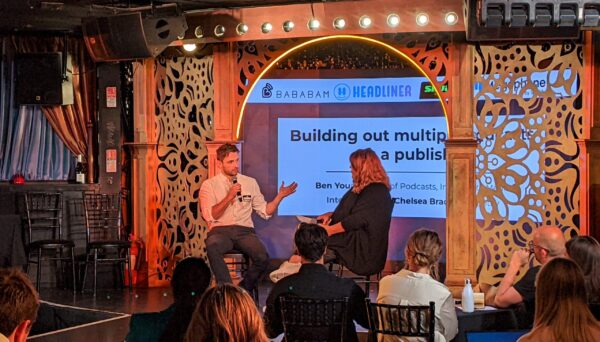
Give it ten weeks, exude confidence, avoid silos and don’t be afraid to make heavy use of post-it notes.
These were some of the tips from the Publisher Podcast Summit in London on Wednesday 5 October.
Organised by Media Voices, the publishers gathered at the event represented an array of podcast experiences and strategies: Press Gazette has detailed elsewhere the revelation from now audio-first Tortoise that its podcasts were profitable within their first 12 months, but the business as a whole still isn’t.
Below, Press Gazette rounds up more insights from the event.
Listen to your audience
Ada Enechi, head of culture at Buzzfeed and one of the hosts of its Seasoned podcast, was one of several speakers who said listening and adapting to audience feedback was key to success.
Enechi (pictured top, second left) told the audience: “We actually used to have a weekly video round-up of the news and then the pandemic hit, and we were tired of filming ourselves at home…
“Listening to our audience – when we used to do the video round-up they wanted more opinions. Myself and my co-host Hanifah [Rahman] are quite opinionated online. We tweet a lot, unfortunately, I’m addicted to that stupid bird app. And they kind of just wanted us to expand on that…
“If you’re hearing from nobody, I think that’s when maybe you should be a bit worried.”
Let your listeners in
A related recurring theme among speakers was that it pays to be personal.
Enechi said: “At the end of the day people want to know the people behind the brands… the funniest tweet from a company that will go viral is the one where it seems like somebody’s drunkenly tweeted something, because you’re reminded there’s a human behind that.”
Esther Newman, editor of Women’s Running and one of two hosts for its Women’s Running podcast, told the event that what had begun as an interview show only took off once its hosts started speaking more about their own lives.
“These women runners that we were [podcasting] to – who are quite a broad demographic – they became invested in us as people as much as they were invested in us as runners. And so we realised that talking about things that were kind of to do with running, slightly, but kind of to do with our lives certainly – those sorts of episodes, where we talked about the lows of stuff… that went down so well.
“We have to plot in a few mental breakdowns as we go forward because those episodes always go down really well.”
Innovation is good, but basics are important
Asked about whether novelty is important, Buzzfeed’s Enechi said: “I think it’s always great to be innovative – people want to see new things, you want to create new things, it is always important. But I think don’t let that halt you from just doing the bare bones.”
She noted that, for example, a chat show’s success is more to do with the host than the format. “Especially with the basics when we’re talking about a chat show – I guess it’s the personalities at the end of the day.”
Should a publisher podcast focus on revenue?
Jendella Benson (pictured, second right), head of editorial at Black Ballad and host of its black maternity and parenting podcast The Survival Guide, was asked by moderator Ollie Guillou (right) whether her paywalled publication treated the show as a driver of revenue.
“We treat it as a separate standalone, but we’re always pointing back to our main offering, which is our website, where relevant,” she said.
“We talk about our memberships as well, but we do treat it as – this is an opportunity for another audience to come to Black Ballad who might not know of us. So we do have it quite self-contained, while still always talking about the wider brand.”
She said it was important to keep paying customers top of mind when creating the podcast: “I really do have to differentiate – how is this podcast going to be different, but complement, what we already do? What can we do to enhance it but also make it a standalone product for those who don’t know about the website…
“As long as you keep your audience at the centre, you can pretty much figure it out.”
Make sure you’re diversified
New Statesman Media Group head of video and audio Chris Stone was asked about what happens when a host audiences have invested in, for example former New Statesman politics editor Stephen Bush, leaves. Bush was one of the co-hosts on the New Statesman Podcast before leaving to write a daily newsletter for the Financial Times in February.
Stone said: “One of the things that we did about a year ago was that we started broadening out the number of voices that we started to bring onto the podcast. And that was for two reasons: one was to future-proof ourselves because we identified [journalists like Bush leaving] as a risk. But also it was to try and introduce our listeners to a broader range of our coverage…
“What it meant was that actually we managed to not only maintain but in fact grow our listenership slightly. Because we’d already established that familiarity with one single presenter and then a rotating cast of voices.”

The FT’s Cheryl Brumley, New Statesman’s Chris Stone, The Week Junior’s Anna Bassi and PPA’s Sajeeda Merali at the Publisher Podcast Summit 2022. Picture: Media Voices
Avoid silos
Stone also warned publishers away from sectioning podcast projects away from the rest of the operation.
“Every publisher I’ve worked for where we’ve launched audio or video, there’s always been a temptation for the new thing to exist over there somewhere. And we’ve always benefited when we’ve worked to bring that new thing more closely into the newsroom – so into the editorial meetings, into the commercial meetings, and to understand where that fits within your portfolio.
“So at the moment we’re having quite a lot of commercial success by combining podcasts, events, newsletters, digital and print all together and then selling multi-platform commercial packages with all of those things involved.”
How many episodes should you let a new publisher podcast run?
Asked how long a new podcast might need to find its feet, Ben Youatt, head of podcasts at Immediate Media, said: “What we would recommend as a blanket rule if you’re a new podcaster is do ten weeks.
“Just do a ten-part series, weekly episodes… If you can’t do ten, do eight. And if you can’t do eight, do six.”
[Read more: How a history podcast from Immediate Media charted its way to £1m annual revenue]
“Don’t do one – that’s silly,” he said. “But give yourself a case study… [which] gives you enough time to learn week-on-week and to test different things.
“Do two weeks where you release a promo video the same day the episode goes out; do two weeks where you release a promo video a week before your episode goes out; put it on the homepage of the website, put it in the newsletter, and do each of these things as individual tests that can be isolated.”

Ben Youatt
head of podcasts, Immediate Media at the Publisher Podcast Summit 2022. Picture: Media Voices
It can be like doing a second job
Will Roe, a producer at The Times and Sunday Times, said that the traditionally print journalists he worked with had found the workload on their narrative podcasts tough.
“I don’t think they quite understood how much [they are] going to take on. All of them said to me, for them, it’s like having two jobs. They’re just working every evening trying to do it alongside the day job… So my top tip is just be ready to work hard.”
Make use of post-its and whiteboards in planning
Storyboarding is not necessarily a familiar skill to print journalists, but when planning a multi-part narrative, some speakers said, it’s essential to have a visual map of your story.
The Telegraph‘s deputy investigations editor Katherine Rushton told the audience: “I would never, ever attempt a narrative podcast without post-its.”
Matthew Chapman, lead reporter at The Bureau of Investigative Journalism, made a similar point. “At the start of the process, we just sat down with eight different whiteboards for each of the different episodes, and we just worked out who the different people we had access to were. And then on post it notes, made sure every episode had a cliffhanger at the end.”
Chapman and Rushton cited strong character and a strong story as the key drivers to a narrative podcast.
The Times and Sunday Times’ Roe advised that when putting narrative podcasts together: “Try and keep it as simple as possible. Sit down with the journalist, try and work out what the story is, what the main beats are… You can get away with just introducing one character per episode – you don’t need more, and I think it is just about storyboarding it as best as you can early on.”
You don’t have to have finished recording when you start publishing – but try to nail down your interviewees
Some speakers suggested it can be useful to start publishing before you’re done recording – as long as you already have the things you need to finish the series lined up.
Speaking about her podcast Call Bethel, The Telegraph’s Rushton told the crowd at the conference: “It became a virtue of the podcast, but basically we hadn’t finished producing the final episodes by the time the first episodes went out, which created a degree of panic in me.
“On the other hand, it turned out to be great because we got all these new sources through that we were then able to feed into those eight episodes and really make a difference. I would think hard about doing that depending on the subject.”
Chapman, who led an investigation into British-American tobacco in Africa in the podcast Smoke Screen, said: “I think my key bit of advice would be around access. I think podcasts live and die on people who you’ve got access to who are telling you their story.
“We had a bit of a tense situation at times where we hadn’t got permissions – we were working in conjunction with our partners or BBC, who are great, but they had interviewed some people and our name wasn’t on the permissions form. Just always think about getting access to these people as soon as possible and getting all the permissions nailed down.”
What makes a good podcast guest?
Gary Sharpen, of The Cocktail Lovers podcast, said in the final session of the day: “What makes a good guest is energy and passion.”
For her part, Olive Magazine’s deputy editor Janine Ratcliffe said: “I want the person whose story hasn’t been told, or the person who’s got something really interesting to say that you might not have heard before.”
And Theodora Louloudis, formerly head of audio at The Telegraph (where she and her team won 2021’s British Journalism Award for features journalism), said: “I think a lot of it comes down to honesty and authenticity.” She said you don’t want “someone who’s just gonna do their own PR, and it’s why politicians don’t always make great podcast guests”.
What makes a good podcast host?
Louloudis said: “You need someone who’s a confident speaker. I have worked with lots of hosts who haven’t started as confident speakers, but you’ve kind of seen glimpses in their personality where you know they could get there and they make you laugh and they engage you when they talk to you, even if they’re a bit nervous behind a microphone at first.”
She said you can teach someone to be a good podcast host, whether the series is scripted or not. “As long as they want to be behind a microphone… you can get everyone to podcast.”
Louloudis added that in her opinion: “The best hosts are the ones who really know that audience so they know which audience they’re trying to target and they know that demographic really well and they know which guests are going to be great for targeting that demographic.”
And Olive Magazine’s Ratcliffe said the best hosts are those the most interested in their guests. Asking interviewees to come up with ten talking points they feel are most important to the subject can help, she added.
“The thing really is actually active listening – listen to your guests, and being interested in your guest. It’s not about you, it’s about that person. So you can’t underestimate doing your research.”
Picture: Media Voices
Email pged@pressgazette.co.uk to point out mistakes, provide story tips or send in a letter for publication on our "Letters Page" blog
